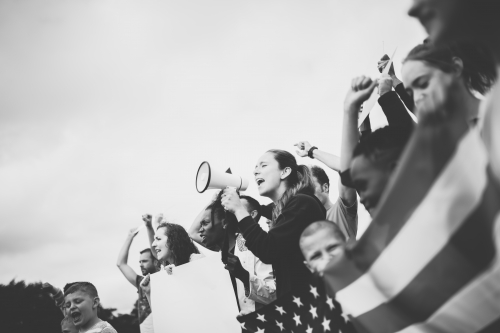Happy Free Speech Week!
This week, October 18-22, is the 17th annual observance of Free Speech Week in America.
When we think of threats to Freedom of Speech, our minds naturally go to powerful examples from history:
- The Founding Fathers built freedom of speech, religion, and the press into our Constitution for a reason. Many of them knew the historical consequences of speaking out against the king or even parliament. But when the United States Constitution and its Bill of Rights were ratified, free speech was still a new concept! Even the early Republic struggled with the concept of “sedition.”
- In just last century, we saw what happened to Dietrich Bonhoeffer and his fellow ministers in National Socialist Germany when they had the temerity to suggest that there was a higher law than the whims of The Leader, or when Soviet dissidents dared oppose the Party line.
So, with no British troops or jackbooted thugs at our door, free speech is alive and well in 2021 America, right?
Well, not exactly. There are at least two types of threats to Free Speech in the United States that are so alarming they represent the high-water mark for recent opposition to this God-given freedom.
-
- There is a threat to free speech on our college campuses.
Some comedians (who are hardly conservative) say they won’t appear at colleges anymore because they’re afraid of being physically attacked for telling a joke. The most recent example of cancel culture run amok is MIT, where a lecture by a world-renowned geophysicist was cancelled because of his views on DEI (diversity, equity, and inclusion).Thankfully, at least 82 colleges and universities know that the search for truth requires that all views should be respected. Many of them, including The Citadel, have signed the Chicago Statement on academic freedom, making it clear that they welcome respectful, non-violent debate and find a free exchange of views to be at the core of their missions. Sadly, no other South Carolina schools have yet adopted this important statement: they should be strongly encouraged to do so. FIRE (the Foundation for Individual Rights in Education), that tracks many of these efforts, just released its 2021 College Free Speech Rankings. It is worth a read. - There is an attempt across America, and even in South Carolina, to “unmask” donors to non-profit organizations who hold policy views they oppose.
These efforts, often couched in “transparency,” have a dark history in this country. Many of our readers will be unfamiliar with government efforts in Alabama in the 1950s to force the NAACP to disclose their donors, providing a hit list for white supremacists. But is a history worth knowing about. Thankfully, in NAACP v. Alabama, the Supreme Court unanimously said that true “freedom of association” meant a person should be allowed to donate to non-profit organizations without fear of being unmasked or exposed. As we wrote earlier this year in the Greenville News, it’s no surprise that this freedom is under attack in Washington. Thankfully groups like People United for Privacy are fighting back. But even here in South Carolina, we are closely monitoring bills like S.174 that could have the effect of restricting citizens’ ability to band together to speak out on issues before the General Assembly.
- There is a threat to free speech on our college campuses.
We hope these resources will inform you and inspire you to take action and spread the word to celebrate Free Speech Week! There has been no more important time to embrace this core First Amendment freedom.






